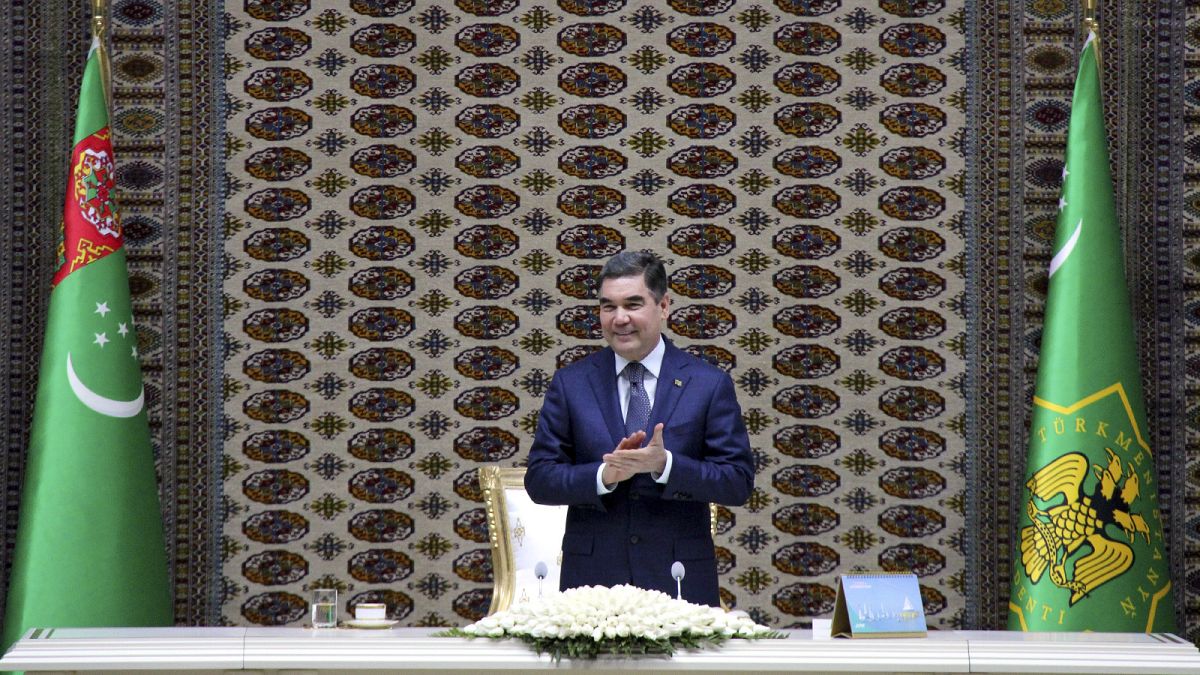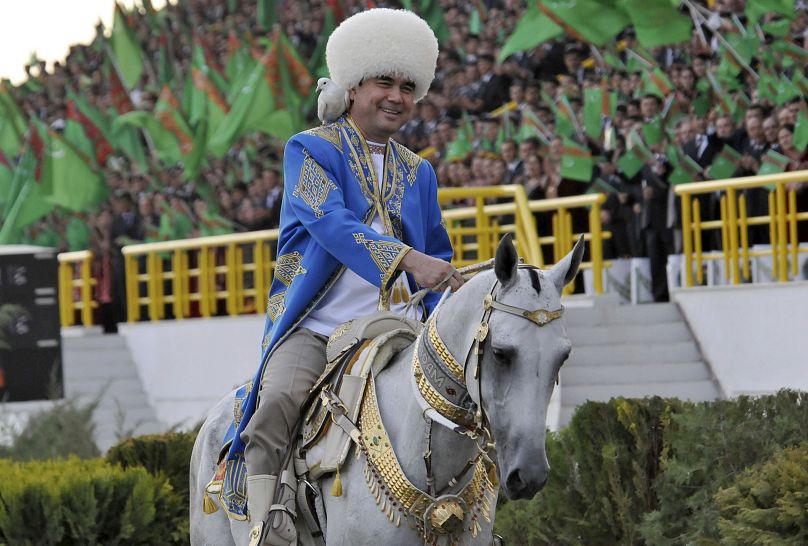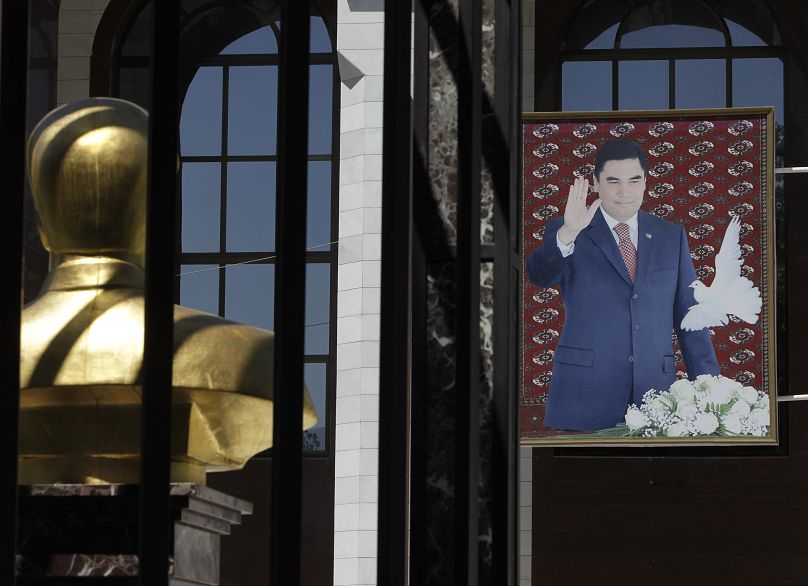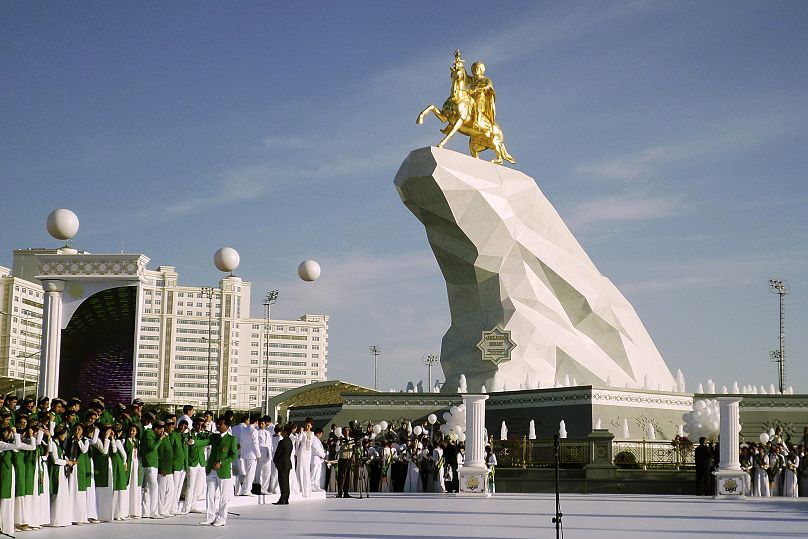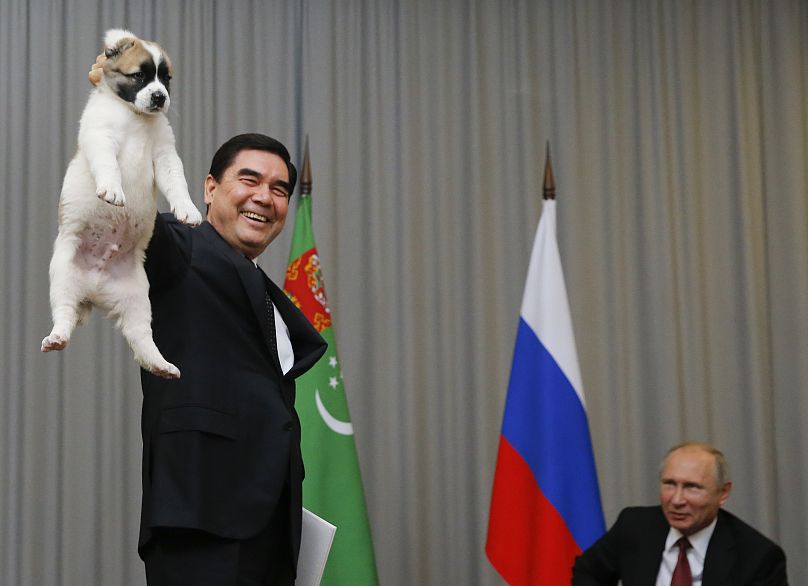Berdymukhamedov’s statement that younger people should direct the country suggested that his son Serdar is in line to succeed him.
Turkmenistan will hold snap presidential elections after the country’s authoritarian leader announced he is ready to relinquish power to younger people.
“Today I want to discuss with you the difficult decision I had made about myself,” President Gurbanguly Berdymukhamedov stated at the country’s National Council on Friday.
“I support the idea that young leaders who have been brought up in a spiritual environment and in accordance with the high requirements of our time should be given an opportunity to lead our country.”
Berdymukhamedov’s public statement makes it almost certain he is lining up his son Serdar for succession.
“I would say it’s 99% certain, he is the only viable candidate for succession,” Peter Leonard, Central Asia editor at Eurasianet, told Euronews.
“The way Turkmenistan is run is that it is such an incredibly centralised one-man dictatorship that essentially whenever you buy the government newspaper or switch on the TV news, there’s ever only one person on TV and that’s the president,” he said.
“But we have seen in the last few years his son occasionally also feature in the news. [Serdar] is a secondary character, but it’s been clear to people who are used to the style and take of the Turkmen state news that he is being profiled as a kind of a second figure in the country.”
Serdar Berdymukhamedov has risen through a series of increasingly prominent government posts — including stints as a diplomat, an MP and a provincial governor — and is now the deputy chairman of the Cabinet of the Ministers, the second-highest position in the country.
“His whole career profile has been unmistakable for a number of years now. He’s been very quickly shuffled from one job to another. Now as the deputy minister of economy, there’s nowhere else to climb, essentially, there’s no other position,” Leonard explained.
Turkmenistan does not have a prime minister post, meaning that Gurbanguly Berdymukhamedov serves as both head of state and head of government.
"The son is now a kind of 'the most equal among equals' and if the president wasn't bluffing when he said he was handing over the power, there's only one person who could aspire to the job."
The presidential election is scheduled for March 12, the parliament declared on Saturday.
No election in post-Soviet Turkmenistan has been considered genuinely competitive.
While eight candidates ran against Berdymukhamedov in the last election in 2017, all expressed support for his government, and Berdymukhamedov tallied more than 97% of the vote.
Cult of personality and police state totalitarianism
A trained dentist, Berdymukhamedov came to power in 2006 after the death of the eccentric Saparmurat Niyazov, known for totalitarian decrees banning public internet access, erecting a rotating gold statue in his image in the capital Ashgabat, or renaming the months of the year after himself and his mother, among other things.
But before he became a larger-than-life dictator, Niyazov was a Communist party hardliner who suddenly realised he was in control of an entire country in the midst of a perilous geographical and political environment.
Turkmenistan gained its independence from the former USSR in late 1991, along with the rest of the Soviet Central Asian republics — today's Kazakhstan, Tajikistan, Kyrgyzstan, and Uzbekistan.
The newly-independent countries found themselves in a very delicate position during a period marked by poverty and instability.
With its long borders with Afghanistan and Iran, Turkmenistan was in an even more precarious situation, Leonard explains, with the latter just coming out of a long and bloody war with Iraq.
"Niyazov was the last First Secretary of the Turkmen Communist Party, so he was one of those leaders who accidentally became in charge of this independent state. And the decision was taken that absolute, all-out authoritarian government was the way to go."
Niyazov decided that the best way to protect his regime and ensure stability was to create a robust police state.
"What we have today is a result of a decision made very early on: this is how you keep a country that might be unstable safe from instability — you unleash secret police on the population, the MNB, which as a successor of the KGB is extremely strong," Leonard explains.
As a result, Turkmenistan had the most political prisoners per capita of all former Soviet countries.
"People are constantly feeling the cold hand of the secret service agents on their shoulder if they take a wrong step, and it was extremely common to have people summoned to the station for intimidatory interrogations if they should do something perceived as even slightly wrong."
Although Berdymukhamedov revoked a number of his predecessor's decisions, he established a pervasive cult of personality similar to Niyazov, adopting the nickname Arkadag, meaning 'protector' in Turkmen.
Not quite North Korea
Berdymukhamedov has been consistently accused of similar repressive totalitarian tendencies, with many human rights organisations considering Turkmenistan to be one of the most closed-off societies in the world.
Freedom House has consistently ranked the country at or near the bottom of its Freedom in the World rankings since its independence — with Turkmenistan scoring a lowly 2/100 in the latest 2021 report, earning it a "not free" designation.
In its 2020 Press Freedom Index, Reporters Without Borders ranked Turkmenistan as 179th out of 180 countries surveyed, only ahead of North Korea.
The country has remained difficult for outsiders to enter, and Turkmenistan has not reported any cases of infection during the COVID-19 pandemic, creating a sense abroad that the country turned into a complete hermit state under Berdymukhamedov.
But although his regime is repressive, "comparisons to North Korea might be taking it a bit too far," Leonard explained.
"The similarities are in the cult of personality, and in the complete control of the media landscape. There's no independent media in Turkmenistan and it's difficult to get out and into the country," he said. "But it's not a country that is totally cut off from the world."
Although state media is carefully curated only to convey messages approved by Berdymukhamedov and his regime, Leonard says that the citizens are not cut off from the outside world and are fully aware of what is happening elsewhere.
"People have access to the internet -- although obviously social media sites and some news sites are blocked, so in that respect, censorship is very strong. But at the same time, anyone with some expertise can quickly get around it using VPNs."
Indicatively, most people in the country have access to satellite TV apart from Arkadag, where people were incentivised to switch to cable access.
"Everybody has satellite TV. The local TV is just unwatchable. People would rather watch Russian or Turkish television, so people have a very strong sense of what is going on in the world," he said.
And yet, Berdymukhamedov cemented a system with virtually no space for any form of opposition.
"It is a totally closed environment. There is no discussion, no criticism, and in that respect, there is no country almost anywhere that even comes close."
Relations with Russia close, cordial yet cautious
Turkmenistan has struggled to diversify its economy, which is overwhelmingly dependent on its vast natural gas reserves while being plagued by rampant inflation. At the same time, foreign investors have accused Berdymukhamedov's government of pervasive corruption, paralysing bureaucracy and discrimination.
But then there is Russia.
Despite earlier disagreements over gas exports to Moscow, the country has consolidated its trade deal, and the two have touted a joint plan to build a Caspian Sea gas corridor.
Berdymukhamedov has maintained friendly relations with President Vladimir Putin, famously gifting him an Alabai puppy for his birthday in 2017.
Yet the country is very proud of its declared neutrality in foreign relations and cautious not to get too close to its neighbour, constraining the relationship to pragmatic economic affairs.
"You know, neutrality is one of these slippery terms," Leonard said. "In Turkmenistan, when they first achieved independence, it meant 'we're going to be friendly with everybody, but we're not going to throw in our lot with any alliance or bloc or country in particular."
"With Russia, there is a very close relationship because of historic ties, business ties. I think in terms of big global partners maybe Russia is the one with whom they kind of speak a similar language — not a literal language, but politically similar in that respect," he explained.
"But always underneath the surface, there was a certain wariness and suspicion: 'we want to be friends with Russia but not so friendly that we are entirely beholden to them.'"
Future promises no change
Since taking power, Berdymukhamedov also became known for his numerous media stunts that included firing a pistol at a human-sized target while riding a bicycle, performing multilingual love songs he supposedly wrote and DJing on live TV, and hoisting a gold weightlifting bar to the applause of his Cabinet.
A lover of the autochthonous Turkmen horses, Akhal-Teke, Berdymukhamedov erected his own gold statue of himself riding the one-of-a-kind Central Asian equine in Ashgabat in 2015.
Leonard says that despite not being nearly as much in the limelight as his more flamboyant father, Serdar is not promising to represent a significant change in actual government policies.
"For my money, no. Because he does not strike me personally as very exciting or interesting, or a bigger, reform-minded thinker."
Having a very centralised economy, Turkmenistan is yet to undergo a full-fledged transition into an open market, and the government has been increasingly more public about considering abandoning its welfare state policies and reducing the size of its apparatus.
But according to Leonard, these notions show a lack of foresight on what that transition would entail in practice.
"When you start talking about liberalising the market, you also need to think about liberalising in terms of the society and people's lives. And in that sense, this will put them in the position of having to decide sooner or later on things that will inevitably let the society evolve."
"I can perceive change happening, but it will be accidental rather than intentional."
Despite clear indications that he is stepping down due to health problems, the 64-year-old Berdymukhamedov is not ready to pass the baton. He is most likely giving away just one of them.
"It's going to be a jobshare type of arrangement," Leonard argued. "He specifically stated that he would hold onto his position as speaker of the Senate, and these formal roles have a certain institutional weight — I mean, they don't now, but they will in this new arrangement."
"So in that sense, yes, he is handing over the presidency, maybe. But he will hold on to other roles here and there. So he's stepping aside rather than stepping down."
